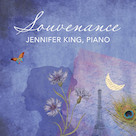

Jennifer King: Souvenance
Jennifer King
A solo piano collection of nocturnes, romances, and meditations by nineteenth and twentieth century female composers, Jennifer King's Souvenance deserves to be heard. The independently issued digital-only release by the British/Canadian classical pianist augments material by Mel Bonis, Fanny Mendelssohn-Hensel, Ethel Smyth, Clara Wieck-Schumann, Cécile Chaminade, and Sophie-Carmen Eckhardt-Gramatté with pieces of more recent vintage, Dana Suesse's “Jazz Nocturne” and Joni Mitchell's “Blue,” and the move's a smart one in showing the range and artistry of the Halifax-based King. As much as the romantic era is the foundation, Souvenance refreshingly extends into the present day too.
King isn't the first artist to champion the too-little-heard work composers such as Fanny Mendelssohn-Hensel and Clara Wieck-Schumann produced, but in adding her recording to similarly themed ones by others, the pianist is doing her part to speak on behalf of figures affected by gender-based barriers. Consistent with the loneliness and longing those artists experienced, the tone of Souvenance is often tender and introspective; hope is present too but as something perhaps more aspirational. Adding to the personal character of the project, the album was recorded in King's living room.
Souvenance isn't, incidentally, her debut; in fact, King's previous release, 2022's O Mistress Moon: Canadian Edition, was judged 'Classical Album of the Year' at the East Coast Music Awards in 2023, and her earlier ones include Doolittle: Minute Études “Excerpts” (2019) and Twilight Hour: Collected Stories for Piano (2020). In a career spanning three decades, she's presented a number of commissions from Canadian composers and delivered hundreds of recitals at festival and concert stages throughout the country. King developed her technique through studies at McGill University, Acadia University, the University of Reading, and the Royal Academy of Music in London, England.
Thoughtfully sequenced, Souvenance intersperses groupings of pieces by French composers Bonis (1858-1937) and Chaminade (1857-1944) with single settings by English composer Smyth (1858-1944), Russian-born Canadian composer Eckhardt-Gramatté (1899-1974), and German pianists/composers Wieck-Schumann (1819-96) and Mendelssohn-Hensel (1805-47). Fittingly, the album advances into the twentieth-century in featuring treatments of pieces by Suesse (1909-87) and Mitchell (b. 1943).
Bonis's Méditation, Op.31 establishes a tone of lyrical serenity that carries over into other settings. King's sensitive touch and nuanced handling of tempo and pacing amplify the dream-like and cantabile qualities of the writing, and while the opener is brief, it's beguiling enough to draw the listener into the recording. Its soulful character remains in place for Bonis's equally lyrical Romance sans Paroles, Op.165, after which Wieck-Schumann's “Notturno in F major” from Soirées musicales, Op.6 No. 2 adds a lamenting poignancy to the recording. Again King's execution shows immense sensitivity in articulating the music's yearning. A number of haunting nocturnes appear on the album, from Smyth's Nocturne (Kanon in Gegenbewegung) and Mendelssohn-Hensel's Notturno in G minor, H-U 337 to Chaminade's Nocturne in B major, Op.165 and Eckhardt-Gramatté's Caprice II Nocturne “Gute Ruh”, E.96.
The album's titular work derives from Chaminade's 6 Romances sans Paroles, Op.76 and is, of course, alluringly romantic; as enticing and one of the set's prettiest pieces is Chaminade's Nocturne in B major, Op.165, whose elegantly flowing patterns are administered terrifically by King. Also from 6 Romances sans Paroles is “Méditation,” which benefits from a regal reading. Eckhardt-Gramatté's Caprice II Nocturne “Gute Ruh” casts a large shadow in stretching across seven explorative minutes.
An American composer as comfortable writing a popular song (see “Moon About Town,” “My Silent Love,” and “Blue Moonlight”) as a classical piece, Suesse (1909-87) studied with Nadia Boulanger in Paris and saw her works presented at a Carnegie Hall symphony concert in 1974. She's represented here by “Jazz Nocturne” from 1932, an intoxicating late-night reverie that works blues shadings into the album and even faint hints of stride. In her arrangement of Mitchell's “Blue,” King's piano largely follows the singer's vocal line—a wise choice when Joni's phrasing is so central to the classic's identity.
While the album only features one piece by Smyth, King has expressed particular fondness for her music, that feeling reflected in the musical play the pianist co-wrote with mezzo-soprano Suzanne Campbell called The Bessie Carruthers Study Club in which King appears as the British composer and suffragist. Though Smyth might be a favourite of the pianist's, she's rendered every one of the album's eleven pieces with the utmost care and with a sincere desire to capture the voice of each composer.May 2025